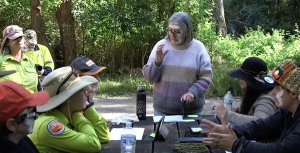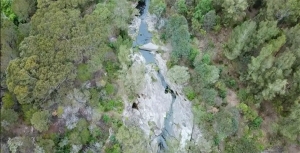Displaying items by tag: Durumbura Dhurabang
Dharug women's-led cultural burn at Browns Waterhole
One initiative that relates to the Durumbura project was the cultural burn near Browns Waterhole that took place in April 2024. Dharug women and allies worked together to undertake the first (since earliest colonisation days) Dharug women’s-led cultural burn. The information in this story comes from Regenavitis, the newsletter of the Friends of Lane Cove National Park.
The cultural burn originated from an invitation and funding from the Department of Planning and Environment’s Cultural Fire Management Team to the Dharug Yanama Budyari Gumada Collective. Macquarie University was also involved with the management of the burn. It is the first time Dharug women have been invited by a government department to restore Dharug cultural knowledges, language, and practices through fire, as a Caring for Country initiative so close to the inner city.
It was actively supported by a variety of Dharug community members as well as the NPWS, Friends of Lane Cove National Park, the three relevant local councils (Hornsby, Ku-ring-gai and Ryde) and the Rural Fire Service. It took about four years to plan the project including preparing a review of environmental factors and developing the burn plan.
The journey involved Dharug women holding a women’s camp in May, 2023, thanks to Ryde Council permitting Dharug women to camp at Waterloo Park – another first! Over the three days of the camp, Dharug women renewed cultural connection to Ngurra/country, engaged in ceremonial practices, storytelling, yarning, weaving, made place-based art, did some tools-based training with NPWS, and engaged in digital data collection thanks to Macquarie University scientists. In the process, they were able to establish the presence of swamp wallabies, bandicoots, goannas, turtles, gudgeons, diamond pythons, echidnas, a large variety of culturally important plants, and, of course, ever-present multitudes of sulphur-crested cockatoos, bell minors, kookaburras, various finches, parakeets, and other important bird species. Soil testing, before and after the burn has also been undertaken to determine changes in soil quality.
Originally it was supposed to be completed by 2023, but due to COVID and poor weather conditions, the burn was delayed until 2024. As such the undergrowth grew in height from around 1 m in 2021 to nearly 2 m in 2024. Nevertheless, the delay allowed for greater time to plan and budget. In March, 2024, Dharug women and allies came together to prepare the site for the burn and it was completed in April. It will be interesting to observe the impact of the burn on the forest ecology in coming years.
Group’s summary of the experience was:
While Dharug women have undertaken the cultural burn according to our cultural priorities of nurturing Ngurra (her soils, plants, animals and other presences), we recognise that based on the contemporary context, working collaboratively together with our allies enables us to continue our cultural ways of knowing, being and doing, as well as bringing others along the journey to establish sustainable futures in the city. Undertaking our cool-fire burn approaches mitigates the threat of mega-fires in the Durrumburra Dhurabang (Lane Cove River) valley, and simultaneously restores and strengthens an appreciation of the values that caring for Ngurra/country enacts.
Lane Cove River restoration – the Durumbura Dhurabang stakeholder project
STEP representatives and many others with an interest in the well-being of the Lane Cove Valley attended a workshop on 16 August organised by Macquarie University. It was led by Dr Jo Rey from the Department of Indigenous Studies.
The restoration project is a recent Dhurag initiative aiming to return traditional custodial ontologies, knowledges, languages, practices to the Lane Cove River catchment in respectful alliance with existing stakeholders.
The goal is to bring best practices together for the well-being of Ngurra/country knowing that if we have healthy country we can have healthy people for a sustainable future.
The participants were representatives from local councils, academics, Macquarie Business Park companies, environment groups, indigenous communities, government organisations such as Sydney Water and NPWS.
The workshop was an initial idea sharing exercise to identify knowledge gaps, issues, barriers to improvement and initial priorities for action.
Urban planning impacts on the catchment
The workshop identified one of the major issues for the catchment is the lack of coordinated monitoring of water quality and modelling of stormwater management requirements. This is vital with the increasing incidence of extreme rainfall events and the rapid increase in residential development and associated infrastructure.
A matter of concern is that there are currently no flood-related development control provisions applying under the Ku-ring-gai local environmental plan. A number of catchment flood studies are being undertaken subject to funding from the NSW government but these are progressing very slowly.
Our planning system needs a major upgrade to improve stormwater controls and reduce pollution from run-off and erosion. All governments and organisations like Sydney Water have to be involved.


